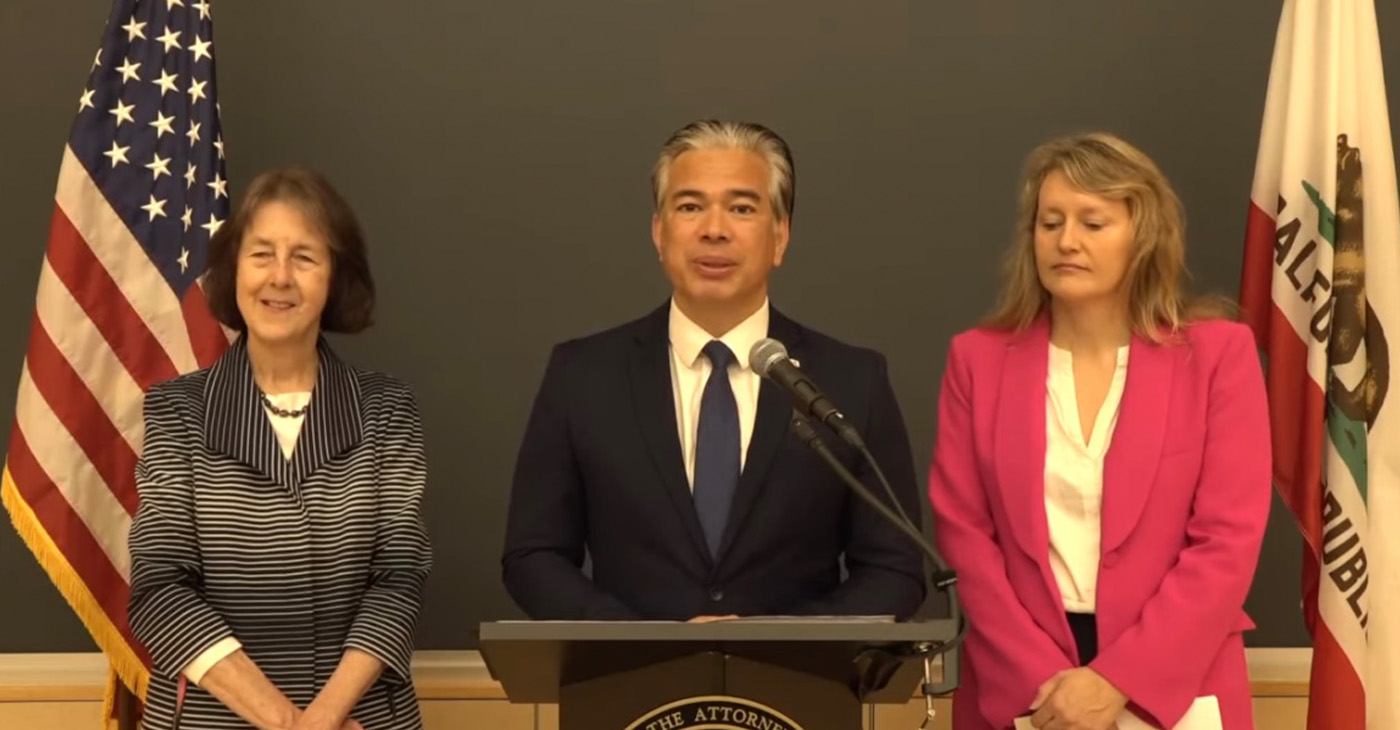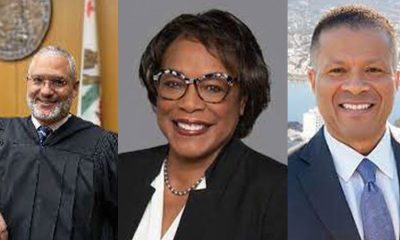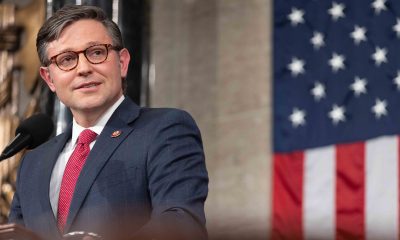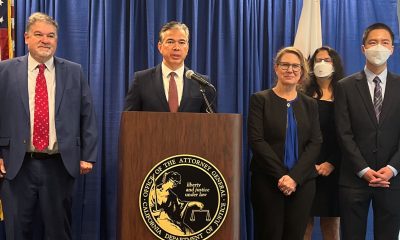Technology
News Guide: Net Neutrality and What it Could Mean to You

In this Oct. 8, 2014 file photo, Federal Communications Commission (FCC) Chairman Tom Wheeler speaks during new conference in Washington. Internet service providers, including those selling wireless connections, would be prohibited from slowing down or speeding up web traffic, under rules proposed Wednesday by a top U.S. regulator that would subject the broadband industry to unprecedented regulation. (AP Photo/Jose Luis Magana, File)
ANNE FLAHERTY, Associated Press
WASHINGTON (AP) — A top U.S. regulator just announced he wants more power to oversee Internet service, much in the same way that the government already regulates phone service and other public utilities. The goal is to prevent Internet service providers like AT&T, Verizon, Comcast, Sprint and T-Mobile from blocking or slowing down Web traffic, or striking deals with companies that provide content like Amazon, Google or Netflix to move their data faster than others.
What does this mean for the average person? Probably nothing right away. One of the big providers will likely take the matter to a federal court and ask the judge to suspend enforcement of the rules until the case is decided.
But this latest decision by Tom Wheeler, chairman of the Federal Communications Commission, opens up a new chapter in Internet history. Equal access to content has been deemed a right of the American public. And depending upon how it’s done, that could mean more taxes.
A look at the issue and why you should care:
___
NET NEUTRALITY
The idea of net neutrality is that websites or videos load at about the same speed. This means you won’t choose to watch “Downton Abbey” on Amazon Prime instead of “Orange is the New Black” on Netflix because Amazon has struck some backdoor deal with your service provider to load its data faster. And when you’re shopping online and comparing prices, images of Eddie Bauer jackets won’t load faster than those on the LL Bean site. As you can imagine, this kind of disparity matters greatly in the world of online commerce and entertainment.
___
WHY NOW
It’s true the Internet has flourished under very little regulation. It’s also true that this exponential growth can be attributed in part to the Internet’s open architecture. Under the threat of regulation and because of market demand, service providers for many years agreed not to pick winners and losers among Web traffic.
What’s changed recently is that Netflix, YouTube and other on-demand video services have become wildly popular, including as an alternative to expensive cable packages. They can hog much of a provider’s bandwidth at any given time. Internet service providers say they have invested heavily to improve their infrastructure to handle the heavy traffic. Isn’t it only fair to charge Netflix and others a “toll” to move their data?
Netflix objects and has compared these toll fees to holding data for ransom.
___
THE PLAN
Chairman Wheeler wants to subject all Internet service, including wireless, to Title II of the 1934 Communications Act. This is the same law that governs phone service and gives the FCC broad authority to ensure everyone has access.
Wheeler says he won’t apply several pieces of the law, including price controls. Industry contends that once Title II is applied, it’s only a matter of time before Internet service becomes bogged down in red tape.
The FCC’s five-member commission is planning to vote on the plan on Feb. 26, and it’s likely the proposal will be approved along party lines. But because of legal challenges, it’s possible the issue won’t be resolved for several more years, even well into the next president’s first term.
___
CONGRESS
Lawmakers could try to resolve the uncertainty, but Congress rarely is that pragmatic. Lawmakers tend to take on issues that fire up their base or bring their states money, and an in-the-weeds compromise on telecommunications law would be a lot of work with little immediate payoff.
So far, Republicans have pitched an idea that would enforce basic open Internet rules but could strip the FCC of its ability to help local municipalities build their own broadband. It’s a nonstarter for President Barack Obama and congressional Democrats who say poor and rural areas have been left behind in the deployment of high-speed Internet.
Assuming Wheeler’s proposal satisfies consumer advocacy groups, Democrats would have little incentive to revisit the issue. While Republicans have the votes to push through their own anti-regulation legislation without Democratic support, Obama would veto it.
___
CONSUMERS
Most Internet providers, except Sprint, have warned that the legal uncertainty would chill future investments. Wheeler has shrugged off these suggestions, citing $300 billion in investment by the wireless industry in the past two decades.
As for taxes, the Progressive Policy Institute estimated that treating the Internet like phone service would trigger taxes and fees up to $15 billion a year, including $67 for each wired service and $72 for wireless in state and local taxes.
But that report, widely quoted by industry lobbyists, did not take into account the Internet Tax Freedom Act, which prohibits state and local governments from imposing new taxes on Internet access, or the FCC’s ability to shield consumers against some state and local taxes by claiming the Internet is an “interstate” service.
Copyright 2015 The Associated Press. All rights reserved. This material may not be published, broadcast, rewritten or redistributed.
Community
Attorney General Rob Bonta, Oakland Lawmakers, Introduce Legislation to Protect Youth Online
At a press conference in downtown Oakland on Jan. 29, Attorney General Rob Bonta joined Sen. Nancy Skinner (D-Berkeley) and Assemblymember Buffy Wicks (D-Oakland) to announce two pieces of legislation designed to protect children online. The bills are Senate Bill (SB) 976, the Protecting Youth from Social Media Addiction Act and Assembly Bill (AB) 1949, the California Children’s Data Privacy Act.

By Magaly Muñoz
At a press conference in downtown Oakland on Jan. 29, Attorney General Rob Bonta joined Sen. Nancy Skinner (D-Berkeley) and Assemblymember Buffy Wicks (D-Oakland) to announce two pieces of legislation designed to protect children online.
The bills are Senate Bill (SB) 976, the Protecting Youth from Social Media Addiction Act and Assembly Bill (AB) 1949, the California Children’s Data Privacy Act.
Skinner authored SB 976, which addresses online addiction affecting teenage users, while Wicks’s bill, AB 1949, takes on big tech by proposing data privacy and children rights protections.
“Social media companies unfortunately show us time and time again that they are all too willing to ignore the detriment to our children, the pain to our children, the mental health and physical challenges they face, in order to pursue profits,” Bonta said.
SB 976 would allow parents to control the nature and frequency of the content their under-18-year-old children see on social media. Notifications from social media platforms would also be paused from midnight to 6 am and controls would allow parents to set time limits on their children’s usage based on their discretion.
Skinner stated that the longer that kids are on their phones during the day, the higher the risk for depression, anxiety and other related issues.
The bill would also push to get rid of addictive media that is harmful for young women and girls, specifically image filters that mimic cosmetic plastic surgery.
Bonta and 33 other attorney generals had previously filed a lawsuit against Meta, owner of the popular social media applications Instagram and Facebook. The filing claims that the company purposefully uses algorithmized content that harms younger audiences.
“Social media companies have the ability to protect our kids, they could act, but they do not,” Skinner said.
The Child Data Privacy Act would strengthen existing protections for data privacy under the California Consumer Privacy Act (CCPA). The lawmakers argue that the law does not have effective protection for those under 18 years old.
Wicks stated that the bill would forbid businesses from collecting, using, sharing, or selling personal data of anyone underage unless they receive informed consent, or it becomes necessary for the purpose of the business.
Wicks added that the acts would make it so that a search on the internet like “How do I lose weight?” would not result in dieting pill advertisements targeting youth, which, some experts report, could be harmful to their mental and physical health.
“In a digital age where the vulnerabilities of young users are continually exploited, we cannot afford to let our laws lag behind, our children deserve complete assurance that their online experience will be safeguarded from invasive practices,” Wicks said.
Supporters of the two acts say they have gained bipartisan support issue, but the authors and Bonta expect them to be met with pushback from the affected companies.
#NNPA BlackPress
Unleashing the Power_ Discover the The Thrills…F-TYPE Convertible
Performance & Handling Powered by a robust 5.0 Liter Supercharged 8 Cylinder Gas Engine, the F-Type R75 doesn’t just purr; it roars with a mighty 575 horsepower and 516 lb-ft of torque. Coupled with an 8-speed Automatic Transmission, the car offers an exhilarating drive that is both fast and smooth. The All-Wheel Drive system ensures […]
The post Unleashing the Power_ Discover the The Thrills…F-TYPE Convertible first appeared on BlackPressUSA.

Performance & Handling
Powered by a robust 5.0 Liter Supercharged 8 Cylinder Gas Engine, the F-Type R75 doesn’t just purr; it roars with a mighty 575 horsepower and 516 lb-ft of torque. Coupled with an 8-speed Automatic Transmission, the car offers an exhilarating drive that is both fast and smooth. The All-Wheel Drive system ensures excellent traction and stability, making it a joy to handle in various driving conditions. The Electric Power Assisted Steering and JaguarDrive Control with Selectable Driving Modes add to the car’s agility, providing a driving experience that is as intuitive as it is thrilling. Additionally, the Adaptive Dynamics and Electronic Active Differential with Torque Vectoring by Braking enhance the car’s responsiveness, making every turn a testament to its engineering prowess. Unique to AutoNetwork.com.
with Selectable Driving Modes add to the car’s agility, providing a driving experience that is as intuitive as it is thrilling. Additionally, the Adaptive Dynamics and Electronic Active Differential with Torque Vectoring by Braking enhance the car’s responsiveness, making every turn a testament to its engineering prowess. Unique to AutoNetwork.com.
Like us on and share https://www.facebook.com/autonetwork
#AutoNetwork
#AutoNetworkReports
Subscribe to our channel now for more videos.
Twitter http://www.twitter.com/liveautos
LinkedIn http://www.linkedin.com/in/autonetwork
Coupons Offers and Deals https://www.couponsoffersanddeals.com/
The post Unleashing the Power_ Discover the The Thrills…F-TYPE Convertible first appeared on BlackPressUSA.
#NNPA BlackPress
Elevate Your Ride…
Join us for a virtual car’s best-detailed walkaround of the sleek and stylish 2024 Jaguar F-TYPE AWD convertible. Get an up-close look at the exterior design, interior features, and performance capabilities of this luxury sports car. From its powerful engine to its advanced technology, this video will give you a comprehensive overview of what makes […]
The post Elevate Your Ride… first appeared on BlackPressUSA.

Join us for a virtual car’s best-detailed walkaround of the sleek and stylish 2024 Jaguar F-TYPE AWD convertible. Get an up-close look at the exterior design, interior features, and performance capabilities of this luxury sports car. From its powerful engine to its advanced technology, this video will give you a comprehensive overview of what makes the F-TYPE AWD convertible stand out on the road. Unique to AutoNetwork.com.
Like us on and share https://www.facebook.com/autonetwork
#AutoNetwork
#AutoNetworkReports
Subscribe to our channel now for more videos.
Twitter http://www.twitter.com/liveautos
LinkedIn http://www.linkedin.com/in/autonetwork
Coupons Offers and Deals https://www.couponsoffersanddeals.com/
The post Elevate Your Ride… first appeared on BlackPressUSA.
-

 Activism4 weeks ago
Activism4 weeks agoOakland Post: Week of March 27 – April 2, 2024
-

 #NNPA BlackPress4 weeks ago
#NNPA BlackPress4 weeks agoCOMMENTARY: D.C. Crime Bill Fails to Address Root Causes of Violence and Incarceration
-

 #NNPA BlackPress4 weeks ago
#NNPA BlackPress4 weeks agoMayor, City Council President React to May 31 Closing of Birmingham-Southern College
-

 #NNPA BlackPress4 weeks ago
#NNPA BlackPress4 weeks agoBeloved Actor and Activist Louis Cameron Gossett Jr. Dies at 87
-

 Community1 week ago
Community1 week agoFinancial Assistance Bill for Descendants of Enslaved Persons to Help Them Purchase, Own, or Maintain a Home
-

 Activism3 weeks ago
Activism3 weeks agoOakland Post: Week of April 3 – 6, 2024
-

 Business1 week ago
Business1 week agoV.P. Kamala Harris: Americans With Criminal Records Will Soon Be Eligible for SBA Loans
-

 Activism2 weeks ago
Activism2 weeks agoOakland Post: Week of April 10 – 16, 2024
























































